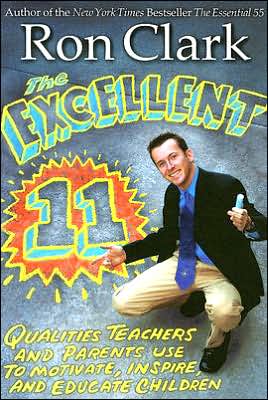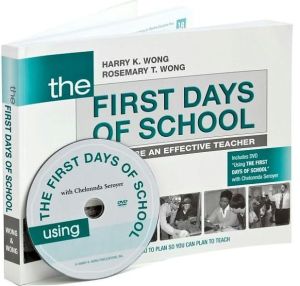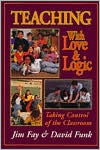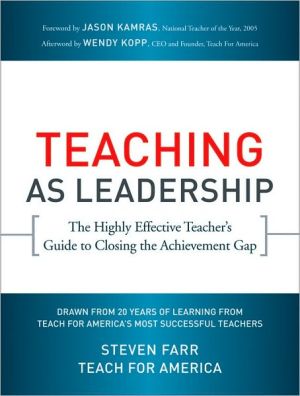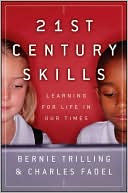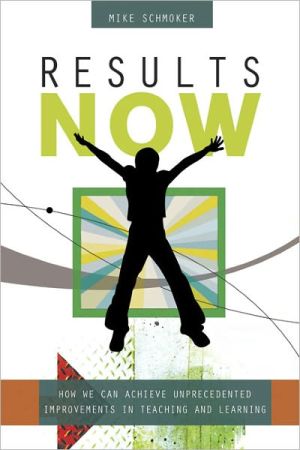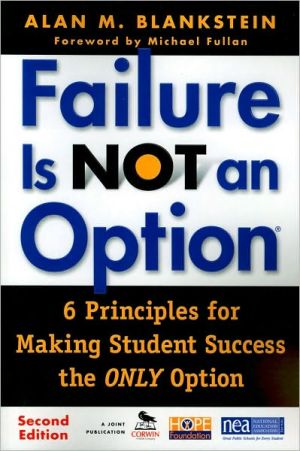The Excellent 11: Qualities Teachers and Parents Use to Motivate, Inspire, and Educate Children
Now in paperback, the national bestseller that's changing America, one student at a time fter publishing his New York Times bestseller The Essential 55, award-winning teacher Ron Clark took his rules on the road and traveled to schools in 49 states. He met amazing teachers, administrators, students, parents-all kinds of people involved in bringing up great kids. In the best of them, he noticed the same qualities that he'd observed in many of the outstanding individuals he'd worked with during...
Search in google:
The Excellent 11 are the qualities that children and students embody when they are passionate about learning -- and about life. After publishing the New York Times bestseller Essential 55, award-winning teacher Ron Clark took his rules on the road and traveled to schools and districts in 49 states. He met amazing teachers, administrators, students, parents -- all kinds of people involved in bringing up great kids. In the best of these people, he noticed the same qualities that he d observed in so many of the teachers, children, and parents he d worked with during his time teaching in North Carolina and Harlem. These are the qualities he describes in The Excellent 11. Ron Clark pinpoints what it takes to make a great student -- and shows that the qualities apply to both educating children and becoming a great teacher or parent. You ll find out what the characteristics are, why they work, and how you can incorporate them into your classroom, home, and life. As he did with The Essential 55, Ron has filled this book with hundreds of suggestions, stories, and wonderfully funny anecdotes. You ll be smiling as you read-and finding the inspiration to change lives, one student at a time. The Excellent 11 are: Enthusiasm, Adventure, Creativity, Reflection, Balance, Compassion, Confidence, Humor, Common Sense, Appreciation, Resilience. Publishers Weekly Part memoir, part inspirational tract and part handbook for beginning teachers, Clark's treatise on how to get children excited about learning lays out some underlying principles of teaching, covering 11 fundamentals: enthusiasm, adventure, creativity, reflection, balance, compassion, confidence, humor, common sense, appreciation and resilience. (This analysis follows Clark's bestselling The Essential 55.) Clark, who was named Disney Teacher of the Year in 2001, shares some of his own blunders and many of his successes while learning to teach, many of which may help new teachers trying to figure out the basics. In a rambling style, Clark relays anecdote after anecdote, as he weaves back and forth from his life as a teacher to his childhood and more advice for teachers, including such details as how to write notes home to parents about field trips. There isn't much depth here, and the book doesn't analyze the nitty-gritty of Clark's own teaching methods or of educational ideas. Indeed, it's more a motivational speech than an educational text, and it isn't hard to imagine Clark speaking these words aloud. However, the book does include some valuable nuggets on how to build children's confidence, help them remember information and teach them to be compassionate, advice that all teachers-but especially inexperienced ones-will find valuable and thought provoking. Agent, Richard Abate. (Aug. 1) Forecast: National publicity, a radio satellite tour and national print ads will boost sales of Clark's second book. Copyright 2004 Reed Business Information.
1. Enthusiasm\ Your enthusiasm will be infectious, stimulating,\ and attractive to others. They will love you for it.\ They will go for you and with you.\ --Norman Vincent Peale (1898-1993)\ I list this quality first for a reason. Nothing is more important than having enthusiasm. If you are a teacher, the students will be excited about learning a lesson if you are eager and excited about teaching it. If you are a parent, children will care about things if they see that they mean a lot to you and that you are energized by them. Children are impressionable, and when they look to adults for guidance, we must inspire them and motivate them to want to learn, to have a desire to achieve, and to want to be the best person they can be.\ Enthusiasm is Contagious\ The end-of-grade test scores are looked at very closely in North Carolina. At the end of one school year our faculty and staff were all nervous about hearing whether our school would be designated "low-performing," just "met growth," or was an "exemplary school." We were in a financially disadvantaged area and always felt that we were playing catch-up with our students, trying our best to get them on grade level. Some years we saw outstanding growth, but the students, no matter how far they came, didn't score on level. It was frustrating and demoralizing for all the teachers. Some individual teachers would get wonderful results with their students, but we didn't seem able to pull it all together as a school. In my fourth year at Snowden Elementary, however, the entire school was named an "exemplary school." It was a huge boost to the teachers and staff, and we were all so excited that we wanted to do something to show the students how much their achievements meant to us. The ideas we came up with cost money, and since it was the end of the year, none of our plans seemed possible on such short notice. A group of us started talking about how neat it would be to have a teacher talent show as a salute to the students. We would dress up as our favorite musical stars from the sixties, seventies, eighties, or nineties and lip-sync before the entire body of students from pre-kindergarten through the eighth grade. I have this thing about surprises, so we agreed that we wouldn't tell the students what was going on; we would just take them to the gym-atorium one day and give them a huge shock!\ Our idea was great, but there was a problem: Many teachers didn't want to do it. They felt the students would lose respect for them and they would look foolish. They said it was too much work, they didn't have a costume or know the words to any songs, and they had no time to practice. In addition, if all the teachers were backstage, there would be no one to watch the students. There was a great deal of pessimism and a lack of morale. On the other hand, the small group of teachers I was working with was enthusiastic and excited about the show, and they kept at it, encouraging other teachers, helping them find costumes, and getting the music together.\ One teacher, Mrs. Bagalour, was very negative. She wasn't one of the students' favorite teachers, because she basically just sat at her desk all day, earning the student nickname for her of "Mrs. Bag-of-flour." She said there was no way she was getting on the stage, but I knew the kids would love it if she participated. A small group of teachers was going to perform "Charlie Brown," and I suggested to Mrs. Bagalour that she sit at a desk, play the part of a student, and throw paper at the teacher along with the other "students." It took a lot of persuading, but she finally agreed.\ Slowly but surely the enthusiastic teachers started to spread their energy around to the other faculty members. We reminded everyone what the show was for and told them how much it would affect the students. We showed them how excited we were about the show and put a little pressure on them to take part. As they heard about the great ideas others had and the effort they were putting into their performance, some of them wanted to become part of the show. As everyone was getting involved and everyone became more excited, no one wanted to be left out.\ There was one last obstacle: A teacher named Mrs. Brokard said she wasn't going to perform because she wanted a certain rendition of the song she was singing, "Ain't No Mountain High Enough," and no one could find it. She said she knew all the words to it, and if that rendition was found, she would put on the show of a lifetime. If it wasn't found, she would not participate. Good grief, the drama. Luckily, my dad used to be a disc jockey in the seventies, and I found myself looking through boxes and boxes of his old albums. When I finally found that song, I felt as if I had actually climbed a mountain myself. I walked in the next morning and showed the record to Mrs. Brokard. She looked a little shocked, a little scared, and a little worried, but she also looked a little excited.\ Soon the day came for the show. As with any school, word had spread that something was going on, but the students couldn't figure out what it was. The students had caught a few glimpses during the week: a feather boa sticking out of Mrs. Woolard's car trunk; teachers passing cassette tapes back and forth; Mrs. Wilson staring into space while bobbing her head and making short movements with her feet; and everyone on the faculty walking with a bit of spirit and excitement. We told our students at lunchtime that they would be going to the gym later for a surprise but that any misbehavior whatsoever would ruin it for everyone. Parents and substitutes watched our classes while we transformed ourselves behind the stage. Soon the extravaganza began. When the curtain opened, the students were informed that they were about to witness a presentation in their honor for their outstanding efforts that year. They were told it was a gift from the teachers because they appreciated each and every one of them and that they were doing this because they cared for all the students of Snowden. And then came the magic. Teachers who never seemed to show enthusiasm or spark were standing before the students, dressed to the nines, dancing and singing away. Mrs. Sawyer was transformed into Diana Ross. Mrs. Jones shocked everyone as Olivia Newton-John from Grease. Mrs. Zurface joined with three others to form the Spice Girls, a crowd favorite. And Mrs. Brokard walked out to cheers as she sang "Ain't No Mountain High Enough." You know, after all that effort, she didn't really know all the words, but she sure put on a show, grinning from ear to ear and working that song. The kids absolutely loved it, and their behavior was perfect -- clapping loudly, paying attention, and showing respectful gratitude with several standing ovations.\ Something was different about our school after that day. We were all a little closer, everyone seemed much happier, and our discipline problems went down drastically. Some said that the students wouldn't respect them if they sang and danced like that, but, on the contrary, they seemed to respect and appreciate us a lot more.\ Enthusiasm is a powerful thing, and it is contagious. When you can use energy, excitement, and a spark to motivate others, you are affecting more people than you can ever know. Those students in Aurora still talk about that show we put on. They say they will never forget it. Whether you are a parent or a teacher, use your enthusiasm to motivate others and affect as many kids as possible. Don't take no for an answer, and when you come across those individuals who stand in your way, do whatever it takes to climb that mountain and take them with you.\ Copyright © 2004 Ron Clark
Introductionix1Enthusiasm12Adventure233Creativity524Reflection825Balance1086Compassion1227Confidence1508Humor1669Common Sense18110Appreciation20411Resilience231In Closing...242Appendix244Thanks and Appreciation262
\ Publishers WeeklyPart memoir, part inspirational tract and part handbook for beginning teachers, Clark's treatise on how to get children excited about learning lays out some underlying principles of teaching, covering 11 fundamentals: enthusiasm, adventure, creativity, reflection, balance, compassion, confidence, humor, common sense, appreciation and resilience. (This analysis follows Clark's bestselling The Essential 55.) Clark, who was named Disney Teacher of the Year in 2001, shares some of his own blunders and many of his successes while learning to teach, many of which may help new teachers trying to figure out the basics. In a rambling style, Clark relays anecdote after anecdote, as he weaves back and forth from his life as a teacher to his childhood and more advice for teachers, including such details as how to write notes home to parents about field trips. There isn't much depth here, and the book doesn't analyze the nitty-gritty of Clark's own teaching methods or of educational ideas. Indeed, it's more a motivational speech than an educational text, and it isn't hard to imagine Clark speaking these words aloud. However, the book does include some valuable nuggets on how to build children's confidence, help them remember information and teach them to be compassionate, advice that all teachers-but especially inexperienced ones-will find valuable and thought provoking. Agent, Richard Abate. (Aug. 1) Forecast: National publicity, a radio satellite tour and national print ads will boost sales of Clark's second book. Copyright 2004 Reed Business Information.\ \
